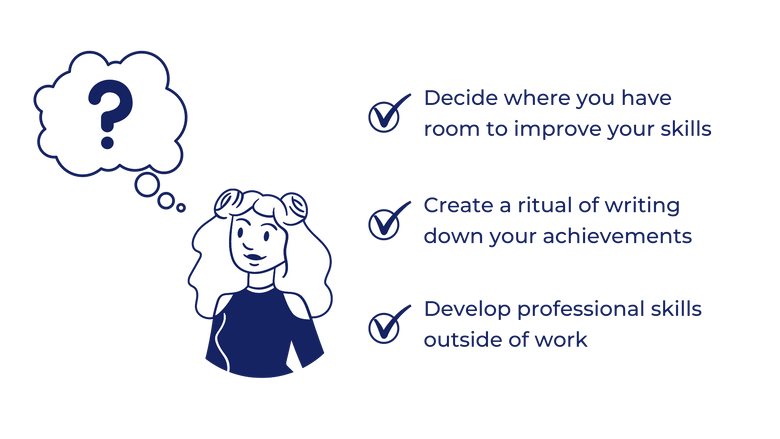How to Land a Promotion or Negotiate a Raise While Working Remotely
Working remotely hinders your visibility within your company. Here are 9 ways to better set yourself up for a promotion or raise.
‘Out of sight, out of mind.’ Remote workers often find themselves having to compensate for the fact that working from home equals less visibility, which makes it harder to land a promotion or a raise.
In a 2015 study conducted in China, researchers from the Stanford Graduate School of Business found that people who work from home were 13% more productive, but were rewarded with promotions at roughly half the rate as their in-office colleagues.
There were two reasons for this, the study found:
- People who weren’t in the office didn’t develop relationships and managerial skills
- They didn’t have the opportunity to demonstrate those skills.
The tendency for people to forget about their colleagues who are working remotely is the result of an unconscious bias. However good you are at your job, when managers see you working, it’s a visual reinforcement that you’re committed to your job.
A 2019 paper found that being observed by others while at work resulted in positive outcomes for employees “because it is a strong signal of their commitment to their job, their team, and their organization.” This is true even for low or mediocre performers.
When work is done remotely, your boss only sees the finished product, not the effort it took to get there. Even if the end result is outstanding, subconsciously your boss may not realize how hard you worked. Consequently, remote workers end up overcompensating just to prove their commitment.
Widespread WFH leveled the playing field during the pandemic, but eventually, most offices are expected to adopt a hybrid policy. Then again, some companies are going fully remote instead, which changes the unspoken rules of how to get promoted. While being likable and touting your achievements are still important traits, in distributed teams, no one really has the upper hand in terms of visibility, so getting promoted is more about your skills and expertise.
This article will include tips on how to stand out while working remotely, communicate your achievements to your superiors, and negotiate a promotion or a raise during these strange times.
Relations With Your Boss

1. Make Your Boss’s Job Easier
The most surefire way to get promoted is by making your boss’s job so easy they can’t imagine getting the same amount of work done without you. An unspoken rule of employment is that you’re there to make your manager successful—while also vouching for your own advancement, of course.
How to Do It
Find out what your boss needs from you and how to deliver it. You can use the ‘Start, Stop, Continue’ framework to better understand how to finetune your actions for your boss’s best interests. Often used in formal employee assessments, ‘Start, Stop, Continue’ constitutes a set of recommendations from the person who is evaluating your work regarding the things you are doing well (Continue), areas where you’re underperforming (Stop), and future goals you should tackle (Start).
Additionally, when you encounter problems, offer solutions and keep your complaints to a minimum. For example, say you’re working as a UX designer and the product team keeps adjusting project timelines, which throws off your workflow. Approach the product manager and ask for a more clear-cut deadline. Then, during your weekly one-on-one with your boss, you can briefly mention the problem and tell him or her how you’ve attempted to resolve it.
2. Focus on Building Trust
There is no such thing as over-communicating when you’re working remotely. Your boss is only human and is therefore subject to the unconscious bias that if they don’t see you working or hear from you for a while, you’re not working hard.
How to Do It
Provide status updates—even on small things—as a way to reassure your boss that projects are moving in a timely fashion. For example, if you have a successful call with a client, send your boss a quick IM to let them know. Or if you’re waiting on a teammate to finish a design mockup so you can do your work, let your boss know and ask if there’s anything else you can take on in the meantime.
3. Talk to Your Manager About Growth Opportunities
If you work for a major enterprise, chances are your company has formal promotional opportunities that are contingent upon tenure or attaining certain KPIs, such as user acquisition or revenue.
How to Do It
Find out what the requirements are, and start conversations with your manager early on about how you can get there. For smaller companies, promotions are offered on a case-by-case basis, or as and when the need arises for a senior employee. In these situations, it’s even more imperative that you ask your manager about how your company determines promotions.
Ask for a set of clear-cut expectations, if possible, and the chance to review your performance in, say, six months’ time in order to be considered for the promotion. Without a formal structure in place, you’ll need to gather information yourself and set a timeline for when you’ll have the final negotiation.
4. Ask for What You Want
Often, the best way to land a promotion is to signal your interest. Not everyone wants to get ahead; promotions go to self-starters who are invested in the company and have a strong desire to grow in their current role.
How to Do It
Every so often, remind your manager of your intentions in a tactful way—don’t let them forget that you’re interested in moving up.
Personal and Professional Development

5. Acquire New Skills and Ask for More Responsibility
‘Start, Stop, Continue’ is also an excellent starting point for investigating what additional responsibilities you can take on that would best serve your manager or your team.
How to Do It
Before you broach the topic with your boss, be very clear with yourself on skills that you’d like to develop or areas where you’d like more experience. Without introspection, you risk taking on projects that run contrary to your goals.
Once you’ve made a list, determine whether you have the required skills, or if you might need to take a course, attend a seminar or read a book. Either way, the best way to win approval for a new project is to demonstrate that you’re qualified to take the lead on it—whether that means enrolling in a quick course to polish your Python programming skills first or making a list of your qualifications for your boss to review.
6. Keep a List of Your Achievements
Don’t let your accomplishments go unnoticed. Keep a list of your achievements—things you’ll brag about at your next job interview or talking points you’ll mention when negotiating a raise or promotion.
How to Do It
If you work a fast-paced job, start a Friday afternoon ritual of writing down three or four things you’ve accomplished that week. Even if you’re working on a long-term project that’s slow to take off, jotting down incremental achievements helps you assemble a narrative later on of how you contributed to the final product.
If you’re struggling to come up with ideas, revisit some of your prior work, reread your job description to better understand how you add value to the team, or ask a friendly coworker what they think of your contributions.
7. Pursue Professional Development Opportunities Outside of Work
Whether you’re trying to improve your skills in your current role or acquire new skills for a senior position. According to 2019 data from the Statista Research Department, employees most wanted to improve their influencing and negotiating (46%), having difficult conversations (24%), design thinking (24%), and leading and managing change (21%).
How to Do It
You can always benefit from taking a course, earning a certification, reading up on industry trends, or training yourself to use a new software solution, design framework, or programming language. Also consider updating your soft skills, not just technical ones.
For example, say you’re a top-notch data scientist who is routinely put to work on challenging projects, but your presentation skills are lacking. Taking a course in public speaking or learning how to make more captivating PowerPoint presentations could open doors for you.
Relations With Your Coworkers

8. Find a Mentor Within the Company
A major advantage of mentorship is it helps you see your blind spots. Even if you’ve enjoyed steady career progression over the last few years, or you’re looking to transition into an adjacent field, a qualified industry insider can help you see what’s holding you back, especially if they are more senior and have been in your shoes before.
How to Do It
If your company doesn’t have a formal mentorship program, ask someone you admire if you can take them to lunch once a week for several weeks in exchange for hearing their advice. Enlisting a mentor within your company means this person is able to vouch for you and can provide advice that is specific to the company.
9. Find Ways to be More Visible
Remote workers and less outgoing people face a similar conundrum: at the end of the day, promotions hinge on visibility.
How to Do It
Try to be there when you can. If you live reasonably close to the company HQ, come into the office at least once a week, if only for important meetings. If you’re located out of state, ask if you can attend the annual general meeting. Most companies pay travel and airfare for out-of-state employees to attend an AGM. Failing that, offer to join brainstorming meetings—even those outside of your department where your expertise may be useful—or mentor a junior employee.
The information provided herein is for general informational purposes only and is not intended to provide tax, legal, or investment advice and should not be construed as an offer to sell, a solicitation of an offer to buy, or a recommendation of any security by Candor, its employees and affiliates, or any third-party. Any expressions of opinion or assumptions are for illustrative purposes only and are subject to change without notice. Past performance is not a guarantee of future results and the opinions presented herein should not be viewed as an indicator of future performance. Investing in securities involves risk. Loss of principal is possible.
Third-party data has been obtained from sources we believe to be reliable; however, its accuracy, completeness, or reliability cannot be guaranteed. Candor does not receive compensation to promote or discuss any particular Company; however, Candor, its employees and affiliates, and/or its clients may hold positions in securities of the Companies discussed.
